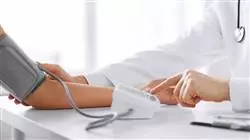University certificate
The world's largest faculty of medicine”
Introduction to the Program
With the study of this program you will be updated on the general therapeutic measures implemented in the face of poisoning by household products or natural agents"

Therefore, it is important to make specific assessments according to the symptoms and signs of the affected person that the specialist must relate to the possible causes and therefore define the precise antidote. For these reasons, it is necessary for the specialist to be familiar with the advances of science in this regard and the updates regarding the assessment and treatment of the poisoned patient.
This Postgraduate diploma brings together a syllabus of high academic level that contains in 5 study modules the most updated contents related to the initial assessment of the poisoned patient, the examinations to be performed, the different types of Toxicology such as hepatic, renal, hematological, neurological and psychiatric.
Also, the epidemiology of snake bites, animal bites, fish poisoning, insects such as wasps, bees and bumblebees. As well as poisoning caused by cleaning, personal hygiene and cosmetic products and their classification according to their toxicity.
Additionally, the graduate will also be able to make the diagnosis of suspected poisoning and diagnostic hypotheses of poisoning in rural areas by pesticides or phytosanitary products, thanks to the 100% online study developed by experts who have poured all their experience in the subject, within the content of this higher level program.
In a practical way and with the guidance of expert teachers, you will recognize plants with toxic potential and their possible antidotes"
This Postgraduate diploma in Toxicological Emergencies caused by Frequently Used Products, Animals and Plants contains the most complete and up-to-date scientific program on the market. The most important features include:
- The development of practical cases presented by experts in Toxicology in the Emergency Room
- The graphic, schematic, and practical contents with which they are created, provide scientific and practical information on the disciplines that are essential for professional practice
- Practical exercises where the self-assessment process can be carried out to improve learning
- Its special emphasis on innovative methodologies
- Theoretical lessons, questions to the expert, debate forums on controversial topics, and individual reflection assignments
- Content that is accessible from any fixed or portable device with an Internet connection
You will delve into the main clinical syndromes caused by the effect of snake venoms on humans"
The program includes in its teaching staff professionals of the field who pour into this training the experience of their work, in addition to recognized specialists from reference societies and prestigious universities.
Its multimedia content, developed with the latest educational technology, will allow the professional a situated and contextual learning, that is, a simulated environment that will provide an immersive training programmed to train in real situations.
The design of this program focuses on Problem-Based Learning, in which the professional will have to try to solve the different professional practice situations that will arise throughout the academic course. For this purpose, the student will be assisted by an innovative interactive video system created by renowned experts.
You will be updated on the most effective diagnostic methods for the assessment of patients poisoned by frequently used products"

This Postgraduate diploma has a team of highly qualified professionals with extensive experience in the area of Emergency Toxicology"
Why study at TECH?
TECH is the world’s largest online university. With an impressive catalog of more than 14,000 university programs available in 11 languages, it is positioned as a leader in employability, with a 99% job placement rate. In addition, it relies on an enormous faculty of more than 6,000 professors of the highest international renown.

Study at the world's largest online university and guarantee your professional success. The future starts at TECH”
The world’s best online university according to FORBES
The prestigious Forbes magazine, specialized in business and finance, has highlighted TECH as “the world's best online university” This is what they have recently stated in an article in their digital edition in which they echo the success story of this institution, “thanks to the academic offer it provides, the selection of its teaching staff, and an innovative learning method aimed at educating the professionals of the future”
A revolutionary study method, a cutting-edge faculty and a practical focus: the key to TECH's success.
The most complete study plans on the university scene
TECH offers the most complete study plans on the university scene, with syllabuses that cover fundamental concepts and, at the same time, the main scientific advances in their specific scientific areas. In addition, these programs are continuously being updated to guarantee students the academic vanguard and the most in-demand professional skills. In this way, the university's qualifications provide its graduates with a significant advantage to propel their careers to success.
TECH offers the most comprehensive and intensive study plans on the current university scene.
A world-class teaching staff
TECH's teaching staff is made up of more than 6,000 professors with the highest international recognition. Professors, researchers and top executives of multinational companies, including Isaiah Covington, performance coach of the Boston Celtics; Magda Romanska, principal investigator at Harvard MetaLAB; Ignacio Wistumba, chairman of the department of translational molecular pathology at MD Anderson Cancer Center; and D.W. Pine, creative director of TIME magazine, among others.
Internationally renowned experts, specialized in different branches of Health, Technology, Communication and Business, form part of the TECH faculty.
A unique learning method
TECH is the first university to use Relearning in all its programs. It is the best online learning methodology, accredited with international teaching quality certifications, provided by prestigious educational agencies. In addition, this disruptive educational model is complemented with the “Case Method”, thereby setting up a unique online teaching strategy. Innovative teaching resources are also implemented, including detailed videos, infographics and interactive summaries.
TECH combines Relearning and the Case Method in all its university programs to guarantee excellent theoretical and practical learning, studying whenever and wherever you want.
The world's largest online university
TECH is the world’s largest online university. We are the largest educational institution, with the best and widest online educational catalog, one hundred percent online and covering the vast majority of areas of knowledge. We offer a large selection of our own degrees and accredited online undergraduate and postgraduate degrees. In total, more than 14,000 university degrees, in eleven different languages, make us the largest educational largest in the world.
TECH has the world's most extensive catalog of academic and official programs, available in more than 11 languages.
Google Premier Partner
The American technology giant has awarded TECH the Google Google Premier Partner badge. This award, which is only available to 3% of the world's companies, highlights the efficient, flexible and tailored experience that this university provides to students. The recognition as a Google Premier Partner not only accredits the maximum rigor, performance and investment in TECH's digital infrastructures, but also places this university as one of the world's leading technology companies.
Google has positioned TECH in the top 3% of the world's most important technology companies by awarding it its Google Premier Partner badge.
The official online university of the NBA
TECH is the official online university of the NBA. Thanks to our agreement with the biggest league in basketball, we offer our students exclusive university programs, as well as a wide variety of educational resources focused on the business of the league and other areas of the sports industry. Each program is made up of a uniquely designed syllabus and features exceptional guest hosts: professionals with a distinguished sports background who will offer their expertise on the most relevant topics.
TECH has been selected by the NBA, the world's top basketball league, as its official online university.
The top-rated university by its students
Students have positioned TECH as the world's top-rated university on the main review websites, with a highest rating of 4.9 out of 5, obtained from more than 1,000 reviews. These results consolidate TECH as the benchmark university institution at an international level, reflecting the excellence and positive impact of its educational model.” reflecting the excellence and positive impact of its educational model.”
TECH is the world’s top-rated university by its students.
Leaders in employability
TECH has managed to become the leading university in employability. 99% of its students obtain jobs in the academic field they have studied, within one year of completing any of the university's programs. A similar number achieve immediate career enhancement. All this thanks to a study methodology that bases its effectiveness on the acquisition of practical skills, which are absolutely necessary for professional development.
99% of TECH graduates find a job within a year of completing their studies.
Postgraduate Diploma in Toxicological Emergencies Caused by Frequently Used Products, Animals and Plants
Toxicology has established itself as a field of great expansion into different sectors of society, so this discipline is presented as an excellent opportunity to project yourself professionally. In our course of Postgraduate Diploma in Toxicological Emergencies you will find the necessary thematic axes so that you can successfully address the different problems of patients, as you will learn a wide guide of protocols that will allow you to be prepared for any situation that arises. Also, with the training that we provide from TECH Global University we will give you the skills so you can respond quickly and you can put in a state of safe health not only the patient with problems, but those around him.
Postgraduate Diploma in emergencies related to toxic products
The content structure that we provide in this postgraduate diploma of 500 hours is focused on your success in the therapeutic processes, because through the classes you will approach the study of each toxic in detail, allowing you to identify the clinical picture through which the patient passes and thus ensure your success during the healing process. This will be possible, since we will improve your knowledge in poisoning by natural agents, patient assessment, life support and other topics that will help you become a professional with the best theoretical and practical skills in this branch of knowledge.







